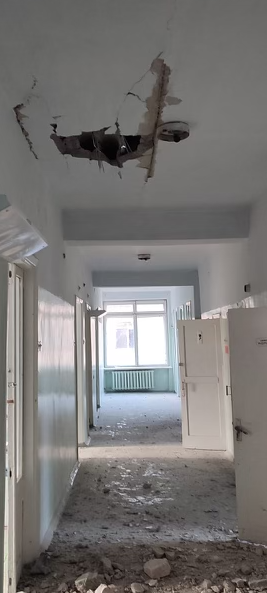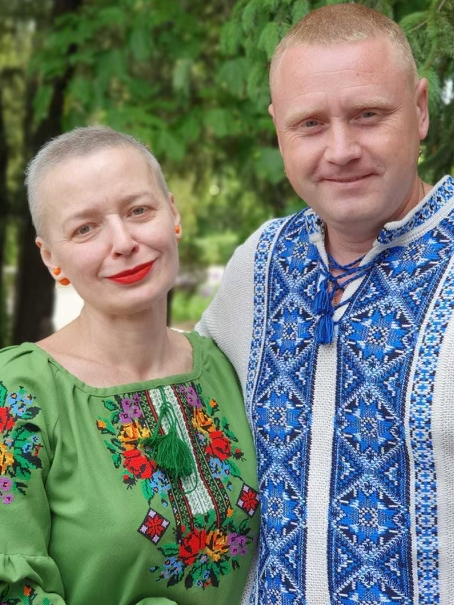March 23, 2023
On February 14, a shell tore into the only tuberculosis hospital in the Kherson region of Ukraine, landing on the third floor of the building and breaking eighty windows. There were 26 patients and eight employees inside, but they were all on the second floor. Miraculously, no one was hurt.
“We tried to fix everything immediately, because the patients needed to be warm, they needed food, they needed treatment,” said Dr. Vyacheslav Musat, the acting director of the hospital. He described staying up all night to find contractors and construction materials to repair the damage – not an easy task in a war zone still experiencing intermittent blackouts. The nurses on duty comforted terrified patients. With the kitchen destroyed, hospital staff cooked at home and brought food to feed the patients.
By the time the hospital was shelled, Musat, his staff and patients had already endured nine months of Russian occupation. Kherson, a port city in southern Ukraine, was liberated last November but remains under constant bombardment by Russian forces. The part of Kherson municipality on the left bank of the Dnieper River remains occupied.

Even in such extreme circumstances, Musat said that they’ve managed to provide continuous care for all 406 TB patients in the area, including 202 patients with the more deadly and difficult to treat multi-drug resistant TB. This is largely due to the bravery and resourcefulness of his staff, he said, as well as ongoing support from the Public Health Center at the Ukraine Ministry of Health and international donors like USAID and The Global Fund to Fight AIDS, Tuberculosis and Malaria. The Global Fund has approved more than $25 million dollars in emergency funding to Ukraine since the war began in February 2022. The emergency funding comes on top of the US$119.48 million allocated to Ukraine to support the fight against HIV and TB in the country over the 2021-2023 period, and on top of the US$50.93 million granted for the COVID-19 response since the pandemic broke out.
TB, caused by airborne bacteria that attacks the lungs, was the world’s biggest infectious killer until COVID-19 arrived. TB is preventable and treatable, but the treatment regime can be arduous, lasting months and causing severe side effects, particularly for those with multi-drug resistant TB.

The TB hospital in Kherson – one of 25 in all of Ukraine — provides life-saving continuity of care for the most vulnerable patients. It also ensures that patients finish their long courses of medication – if they don’t, they are at higher risk of developing a drug resistant strain of the disease. Ukraine has the fifth-highest number of confirmed cases of extensively drug-resistant TB in the world, and fourth-highest TB incidence among the 53 countries in Europe where the World Health Organization operates.
Despite immense challenges like the destruction of infrastructure and loss of electricity, Ukraine still managed to track new TB cases and deaths in 2022, registering 18,241 cases – a 2.5% increase over the previous year — and 2,873 deaths. Yana Terleieva, who leads TB work at the Public Health Center at the Ukraine Ministry of Health, said she and her colleagues expect the war will have a more dire negative impact on the fight against TB over the next few years, especially if the war continues and international support starts to wane.
“It is important that TB continues to be the focus of political and international attention so that our country’s achievements in fighting the disease are not leveled,” she said.
During the Russian occupation of Kherson, Dr. Musat described using covert methods to distribute TB medication to the other side of the Dnieper River, even wrapping it up in dirty clothes to conceal it.
“The car had to go through 25 check points – the Russian soldiers checked phones, where the car is coming from, where it’s going to, even Red Cross signs on the car did not help. Everything soldiers liked, they could take away. If they saw medicine, they could take it,” he said. “We tried to make sure patients had some stock of medicine so they could survive for some weeks and months. We had to find creative ways to deliver drugs to them.”
At the same time, the team was under immense pressure. Dr. Natalya Krysenko, head of the outpatient department at the hospital, said Russian forces tried to coerce TB patients and staff to evacuate to Russia. Most refused. Due to roadblocks, Krysenko walked two hours to the hospital every day, during a time when Russian forces were kidnapping civilians they saw as hostile to the occupation. In May of last year, Ukrainian internet and cell phone service was cut off, disrupting virtual care for TB patients being treated at home. Krysenko described going to the roof of a nine-story building just to find a Ukrainian cell phone signal.
Even though the mood was celebratory when Ukrainians liberated Kherson last November 11, Krysenko said the Russians sabotaged the water supply and electricity grid on their way out. “For one month, we had neither water nor electricity,” she said. And now, the shelling is constant and “chaotic.” They can also no longer reach the left bank of the river with supplies because it is still under Russian control.
Musat described talking to a TB doctor in an occupied area whose clinic was completely destroyed.
“He managed to grab some drugs, and right now he’s treating three patients. He didn’t leave them. This is just courage. Today he told me, ‘I have no workplace, but I have 3 patients.’ This is our truth today.”
For some patients who’ve lost their homes, the doctors and the TB hospital are all they have left, said Terleieva from the Public Health Center.
“Many patients are permanent residents of the hospital,” she said. “For many patients, this facility is not only a health facility, this is also their home. Many of them lost members of their family so now these health care providers are part of their family.”
Learn more:
How the Global Fund Works in Challenging Operating Environments
Global Fund Announces Additional Emergency Funding in Ukraine After One Year of War
